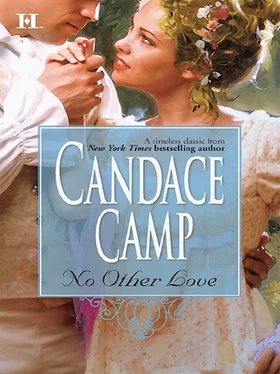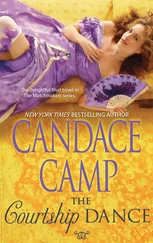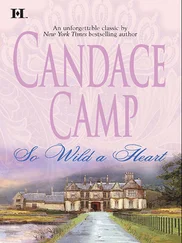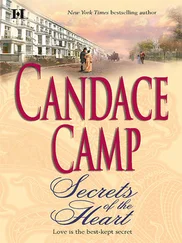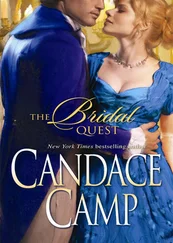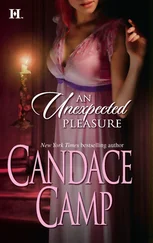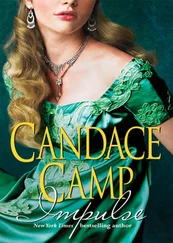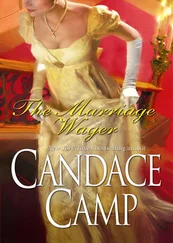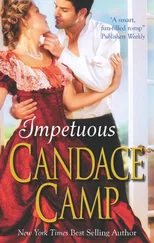Nicola sighed. This was a favorite theme of her mother’s, even though Nicola had rarely seen her mother lift a finger to organize the household or raise a child. “I have no intention of not marrying, Mama. However, it will be when and to whom I want. And that certainly will not be now or to Lord Exmoor.”
Still, there was little way to avoid the man unless she wanted to become a social recluse. He was bound to be at any local party or dinner; having an earl in one’s house was considered a feather in any matron’s cap, even one as supposedly unworldly as the vicar’s wife. Worse, her mother insisted on accepting any invitation he sent their way.
So it was that Nicola attended the hunt at Tidings, the Exmoor estate, and trotted into the yard, flushed from the activity, her hair coming loose in little tendrils around her face. As the Exmoor grooms rushed out to take the reins of the horses, Nicola looked down and found herself staring into one of the handsomest faces she had ever seen.
He was larger than most of the grooms, taller and leanly muscled. Dark, mischievous eyes gazed out from his tanned face, framed by a mop of thick black hair. A smile widened his mobile mouth as he gazed up at Nicola. Nicola stared back, feeling rather the way she had the time she fell out of the oak tree when she was little, as if the world had somehow stopped and she was floating free from it, as if her lungs no longer worked, but her heart was skittering double time.
He reached up his hands toward her, black eyes dancing. “Help you down, miss?”
She could not answer, simply pulled her foot from the stirrup and twisted off the sidesaddle, leaning down to him. His hands grasped her waist, lifting her down effortlessly, and she braced her hands on his shoulders to steady herself. She could feel the heat of his body beneath the rough woolen shirt, the hard stretch of bone and muscle. For an instant they were close, his face so near hers she could see the thick, dark fringe of lashes that shadowed his eyes. Then she was on the ground, and in the next instant, the Earl was there, stepping around the groom to take her arm and lead her into the house.
Nicola scarcely heard a word he said—nor much of any of the rest of the conversation through the hearty post-hunt brunch. Her thoughts were on the groom. She wanted to know his name, but she could think of no way to inquire about him that would not sound exceedingly strange. And even if she could have phrased it acceptably, she knew that it was doubtful that anyone would know who he was, even the Earl, who employed him. Servants might as well have been part of the furniture to most people of her social set, she knew, and though they knew the name of the most important ones—the butler, the housekeeper, their personal maid or valet—it was rare that they knew the names of the multitudinous footmen, maids and grooms. So she was forced to leave later without having learned anything of use to her.
After that, her mother no longer had any difficulty in persuading her to attend a function at Tidings. When her mother suggested they pay a thank-you call the following day, she acquiesced without a murmur, causing her mother to glance at her oddly. The next week she agreed to attend a small dinner party at the Earl’s house, and when he suggested a picnic up on the moor, leaving from his house, she smiled and agreed that the idea sounded lovely.
But despite all her efforts to be at Tidings—which had cost her a great deal of inner squirming—she did not catch even a glimpse of the groom. She surmised that he was not important enough in the line of command in the stable to be allowed to interact directly with guests unless there were such a large number present that they needed all the grooms, such as at the hunt.
She told herself that it was foolish to be so interested in the man. She had, after all, seen him only for a moment, and just because she had had that odd response, it did not mean that he was anyone special or significant. It could have been just some odd physical twinge, indicative of nothing.
She could not even have said what she hoped to accomplish by seeing the man again. All she knew was that she was restless and unsettled, that she had to see him.
Oddly enough, it was not at Tidings that she came face-to-face with him again two weeks later. It was at Granny Rose’s cottage.
Not long after she had moved to Buckminster, when she had administered a tonic to one of the upstairs maids for a head cold and given a salve to the gardener to ease the pain of his reddened knuckles, people had begun to tell her about an old woman in the area. Everyone called her Granny Rose, though Nicola surmised that no one was actually related to her. She was known throughout the countryside for her remedies. There were even those who superstitiously considered her a witch. It was said that she knew more about plants and their medicinal properties than anyone, and for miles around, people had long relied on her potions to ease the pain of childbirth or protect a wound from infection. Even the old Lord Buckminster himself, who had suffered terribly from the gout, had availed himself of her remedies to ease the disease.
Nicola immediately wanted to meet the woman, and after some cajoling, she got one of the maids to lead her through the woods to the woman’s cottage, nestled in a pleasant spot sheltered by a group of trees cupped like a hand around the little house. It was a small structure of wattle and daub, with a thatched roof, and so overgrown with ivy along one side that in summer it almost blended in with the green trees behind it. A small garden of herbs grew beside the house, tinging the air with scent.
Granny herself seemed almost as ancient as the house, her skin creased and browned like a withered old apple, and her hair a pure snow white. But her eyes were merry and younger than she appeared, and her smile, though gaptoothed, was so warm that one had to respond to it in kind.
Nicola took to the old woman at once, and Granny Rose had an equal affinity for Nicola. Nicola was soon riding over to the little cottage frequently, where Granny taught her far more about herbs and medicinal plants than Cook had ever known—although it took her a little time to understand Granny’s thick Dartmoor accent. Nicola helped her with her garden of herbs and plants and walked with her in the woods, where Granny searched for wild plants, pointing them out to Nicola and explaining all their uses and dangers. She taught her how to decoct her potions, how to dry and cook and steep and grind, what proportions to use. Nicola diligently wrote down each step of her recipes, adding them to her collection. Granny, who told her that her own daughter had never been interested in learning her secrets, was happy to entrust them to Nicola to use and preserve.
Granny was wise in many other ways, too, and Nicola often stayed to chat with her over a cup of fragrant tea. She had told her about her father and his death, about her mother, even about the persistent pursuit of the Earl of Exmoor. Granny frowned at this and shook her head.
“A bad ‘un, that ‘un. Ye best be stayin’ away from him,” she said grimly.
“Bad?” Nicola looked at her, faintly surprised. Though she had not liked the Earl, she had not attributed it to any sense of evil in the man. “But no one has said that he has done anything wrong.”
“Mayhap they don’t know it,” Granny pointed out, with a sage nod of her head. “Mayhap he’s good at hiding it from his own sort. But them that works fer him, they see, and they know. There’s no kindness in the man.”
“Well, I shan’t be marrying him,” Nicola assured her. “No matter what Mother thinks.”
After that conversation, she was a little embarrassed to tell Granny that she had gone against her own judgment and had been to Tidings as frequently as she had been able to the past two weeks. Besides, she found herself reluctant to reveal her desire to see the groom again. Granny would no doubt find it as odd as any of the people in her own class would; ladies did not mingle with grooms, even ladies as pleasant and down-to-earth as Nicola. Moreover, Nicola found herself reluctant to share anything about the feeling that had swept over her; it was something she had hugged to herself for two weeks.
Читать дальше
